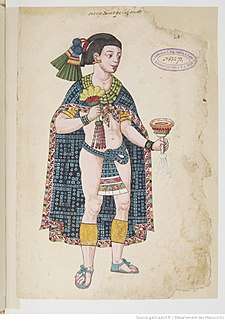Nezahualpilli
Nezahualpilli (Nahuatl for "fasting prince"; 1464–1515, ![]()
| Nezahualpilli | |
|---|---|
| Tlatoani of Texcoco | |
 A non-contemporary depiction of Nezahualpilli from the Codex Ixtlilxochitl. | |
| Reign | 1473–1515 |
| Predecessor | Nezahualcoyotl |
| Successor | Cacama |
| Born | 1464 |
| Died | 1515 |
| Issue | Cacama Many other children |
| Father | Nezahualcoyotl |
Like his father, he was a poet, was considered a sage, and had the reputation of being a fair ruler. Only one of his poems survives: "Icuic Nezahualpilli yc tlamato huexotzinco" ("Song of Nezahualpilli during the war with Huexotzinco"). His court was a haven for astronomers, engineers, and soothsayers. During his reign, he abolished capital punishment for a number of crimes and struggled to keep the political independence of Texcoco during the increasing centralization of Aztec power in Tenochtitlán.[1]
When he told Moctezuma II that the Texcocan wise men had foretold foreign dominion over the Valley of Mexico, the emperor challenged him to a ball game. Moctezuma considered the loss of the game a negative omen.[2][3]:15
He married a daughter of Ahuitzotl only to later have her executed. Her public improprieties and high social status qualified her for a punishment that would not have been applicable to someone of a lower status. He was said to have taken numerous consorts and fathered 144 children.
Nezahualpilli was succeeded by his son Cacama.
Notes
- Miguel León-Portilla (1967). Trece poetas del mundo azteca [Thirteen poets of the Aztec world] (in Spanish) (2nd 1978 ed.). Mexico City: Universidad Nacional Autonoma de México. pp. 77=87.
- Fehrenbach (1973), p.103
- León-Portilla, M. 1992, 'The Broken Spears: The Aztec Accounts of the Conquest of Mexico. Boston: Beacon Press, ISBN 978-0807055014
References
- Fehrenbach, T.R. (1973). Fire and Blood: A History of Mexico. New York: Macmillan.
- Anders, Ferdinand and Maarten Jansen (1988), Schrift und Buch im Alten Mexiko. Graz: Akademische Druck - und Verlagsanstalt.